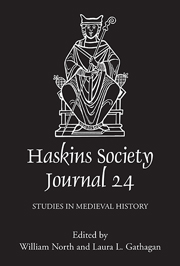Book contents
- Frontmatter
- Contents
- List of Figures
- Editor's Note
- Abbreviations
- 1 ‘Those Five Knights which you Owe me in Respect of your Abbacy’. Organizing Military Service after the Norman Conquest: Evesham and Beyond
- 2 Voluntary Ascetic Flagellation: From Local to Learned Traditions
- 3 The Material and the Visual: Objects and Memories in the Historia ecclesiastica of Orderic Vitalis
- 4 Anonymus Vaticanus: Another Source for the Normans in the South?
- 5 Christian Community and the Crusades: Religious and Social Practices in the De expugnatione Lyxbonensi
- 6 Godric of Finchale's Canora Modulatio: The Auditory and Visionary Worlds of a Twelfth-Century Hermit
- 7 Did Portugal Have a Twelfth-Century Renaissance?
- 8 Internal and External Audiences: Reflections on the Anglo-Saxon Archive of Bury St Edmunds Abbey in Suffolk
7 - Did Portugal Have a Twelfth-Century Renaissance?
Published online by Cambridge University Press: 05 December 2013
- Frontmatter
- Contents
- List of Figures
- Editor's Note
- Abbreviations
- 1 ‘Those Five Knights which you Owe me in Respect of your Abbacy’. Organizing Military Service after the Norman Conquest: Evesham and Beyond
- 2 Voluntary Ascetic Flagellation: From Local to Learned Traditions
- 3 The Material and the Visual: Objects and Memories in the Historia ecclesiastica of Orderic Vitalis
- 4 Anonymus Vaticanus: Another Source for the Normans in the South?
- 5 Christian Community and the Crusades: Religious and Social Practices in the De expugnatione Lyxbonensi
- 6 Godric of Finchale's Canora Modulatio: The Auditory and Visionary Worlds of a Twelfth-Century Hermit
- 7 Did Portugal Have a Twelfth-Century Renaissance?
- 8 Internal and External Audiences: Reflections on the Anglo-Saxon Archive of Bury St Edmunds Abbey in Suffolk
Summary
Over the seventy-five years since its publication, scholars have continued to adjust and refine Professor Charles Haskins' classic historiographical label ‘Renaissance of the twelfth century’. Nevertheless, the concept remains a useful springboard with which to approach, understand, and explain the cultural changes, the accelerations, and the innovations that took place in Western Europe in the course of the twelfth century. Yet, like any other conceptual tool, it has limits in scope that confine its utility geographically and chronologically, as well as qualitative limitations in terms of the particular events and achievements that are its raison d'être. Defining events, such as the flowering of dialectic or the coming of age of the study and production of canon law, coincided with each other only in certain places and at given times. Portugal is one place where such a conjunction of events and achievements never occurred. Portugal, in other words, did not have a Renaissance in the way imagined by Haskins for medieval Europe.
This fact should be of some consequence for Portuguese history, since the twelfth century is the country's century of birth. To be born in the age of Abelard, Gratian, or Azo might be auspicious, were it not for the fact that all three — as well as every major intellectual figure of the twelfth-century Renaissance — led their lives and produced their works far from Portugal and without any attestable connection to it. Of course, their work and the work of other leading figures of the Renaissance of the twelfth century did reach Portugal, but it did so unevenly and piecemeal. Gratian’s magnum opus was known in Portugal by the second half of the twelfth century, as was the theology of St Bernard and Hugh of St Victor, but it is highly doubtful that Abelard’s ever was.
- Type
- Chapter
- Information
- The Haskins Society Journal 242012 Studies in Medieval History, pp. 145 - 162Publisher: Boydell & BrewerPrint publication year: 2013

